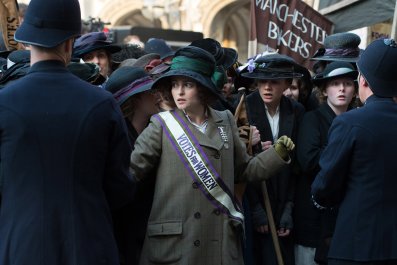Spectre is almost upon us. Trailers have made it clear that the 26th James Bond movie—Daniel Craig's fourth outing in the role and Sam Mendes's second as director—will feature some reassuringly familiar Bond-movie tropes: death in the snow, sex on the fly, one-liners by the dozen. But while Mendes appears at peace with giving audiences much of what they expect from Bond films, the Oscar-winning director is not in the Bond business just to recycle clichés. Pre-publicity for Spectre suggests that Mendes is continuing the exploration of Bond's history that he began in Skyfall, the most recent and, so far, most financially successful film in the series. In so doing, Mendes is attempting to fill out the occasionally blank but compelling main character in British author Ian Fleming's original 12 Bond novels, the first of which was published 62 years ago. Those novels have sold more than 100 million copies, but many of the people who see Spectre in the coming days and weeks may not have heard of Fleming. They're missing out. Two and a half hours of cold martinis, Craig's merciless gaze and the producers' even more chilling devotion to product placement can give you only a limited sense of Bond. For a fuller picture, pick up a Fleming novel once you're back from the multiplex. The author was himself parsimonious with details about the famous spy's biography, but he fleshes out 007 with gems of dialogue and description.
The initial Bond novel, Casino Royale, was published in 1953, and it was apparent from the very first line—"The scent and smoke and sweat of a casino are nauseating at three in the morning"—that Fleming had a complete sense of his character. By the end of Chapter 1, five pages later, when Bond, still holding the "butt of the .38 Colt Police Positive with the sawn barrel," fell asleep, and "his features relapsed into a taciturn mask, ironical, brutal, and cold," we know all we need to know about him. The book's famous last line—"The bitch is dead now," Bond says when he calls headquarters to relate that his double-agent lover, Vesper Lynd, has killed herself—reaffirms his heartlessness, his barely concealed misogyny and his reflexive devotion to the cause.
Subsequent novels add intriguing dabs to his character and history: He gets married in On Her Majesty's Secret Service (1963), but—spoiler alert, if it's entirely necessary at this point—villain Ernst Stavro Blofeld kills Bond's wife on their wedding day, and Bond once again becomes a loner. In the penultimate novel, You Only Live Twice (1964), Fleming reveals that 007 had a Swiss mother and a Scottish father, and he was orphaned at age 11—a skeletal backstory that inspired the second half of Skyfall, which takes place in the childhood home in Scotland that Mendes invented for him.
The lack of information was deliberate: "I wished him to be unobtrusive. Exotic things would happen to and around him, but he would be a neutral figure," Fleming wrote in April 1958 in a letter to The Manchester Guardian, in response to an article criticizing the "sex, violence and moral decay" of Bond's world. Yet in order to create an "illusion of depth," he had to "fit Bond out with some theatrical props"—the guns, the cigarettes and the vodka martini cocktail, shaken "very well until it's ice-cold" and served with "a large thin slice of lemon-peel," as Fleming described it in Casino Royale. (Several months later, Fleming tried the drink, which he "found unpalatable.") Fleming also allowed his spy "a rather precious though basically simple meal," although in fact it wasn't simple at all: When Bond first has dinner with Vesper, he has caviar, "a very small tournedos, underdone, with sauce Bearnaise and a coeur d'artichaut"—a steak and artichoke heart, followed, rather oddly to modern habits, with "half an avocado pear with a little French dressing." The decadent meal proved popular with readers, who were still suffering from wartime food rationing.
It was not just the diet that must have seemed unimaginably rich in postwar Britain: the glamorous women, the distant locations and the flights that take Bond to those places; the expertise in moneyed pursuits such as gambling, skiing and scuba diving; and the mixture of deference and lingering superiority that characterizes Bond's relationship with the CIA agent Felix Leiter and implies that postcolonial, postwar Britain is still an equal partner with its American cousin. All that must have been thrilling to many readers in the 1950s and '60s.
Some elements of the books have dated badly, most notably Bond's—or Fleming's—attitude toward women. In her introduction to Casino Royale, Scottish novelist Candia McWilliam refers to what she calls the "pleasingly retro tropes of sexism," which generously excuses it as being of its time. There is racism and snobbery as well. But there are compensations. The plots are tightly constructed and play out in vividly realized settings; Fleming is a master of the deceptively difficult art of creating a sense of place through the accumulation of physical details and sensations, without losing narrative momentum. (Kingsley Amis, who wrote the first of the many post-Fleming Bond novels, which include installments by Sebastian Faulks and William Boyd and a subgenre of Young Bond novels by Charlie Higson, once said that the island in Dr. No was the perfect fictional location.)
The secondary characters, including Bond's colleagues, his foes and his women, are real enough to have survived countless reinterpretations on film and in the follow-up novels. Yet it is Fleming's Bond who still holds our attention. If Spectre proves anywhere near as successful as Skyfall, it will be not only because of masterful marketing but also because we still hunger to know more about the enigmatic presence at the heart of Fleming's novels and stories.






















